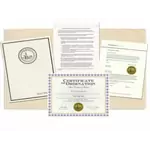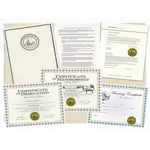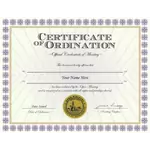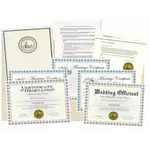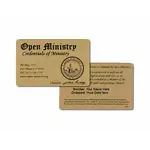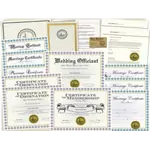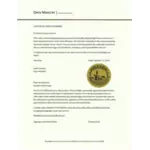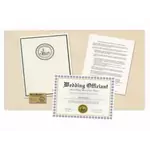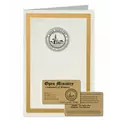State Marriage Laws and Information
Since 2010, Open Ministry has been ordaining and helping people all over the world perform weddings, ceremony and other sacerdotal duties. This page focuses on requirements and information for Massachusetts; Scroll down to the bottom of the page for links to other states.
How to get ordained and perform a wedding in Massachusetts
If you are planning to get ordained in Massachusetts or you have been asked to perform a wedding ceremony in Massachusetts, or simply need to to find an ordained minister in Massachusetts to perform your wedding ceremony.
This ordination information forMassachusetts is provided below in an easy five step layout which is designed help walk you through the most common steps on registering to become a minister for Massachusetts and how perform a wedding ceremony in Massachusetts.
Step 1 - Get Ordained Online for free with Open Ministry
Step 1: Get Ordained in Massachusetts with Open Ministry
Receive your clerical ordination in Massachusetts through Open Ministry-100% free and fully online, with your digital ordination confirmation delivered instantly and printed proofs offered at our bookstore.
When you get ordained in Massachusetts through Open Ministry, you’ll enjoy:
- Digital ordination - confirmed via email free of charge.
- Optional printed certificates - available in our store.
- Universal recognition - valid across Massachusetts.
- Unlimited officiant scope - weddings, elopements, vow renewals.
- Community vetted - join ministers since 2010.
How It Works
- Click Get Ordained in Massachusetts.
- Provide your details on our encrypted form.
- Check your inbox for your free digital ordination; then order printed certificates.
With Open Ministry’s ordination, you become an officially empowered minister in Massachusetts, able to officiate legal wedding ceremonies statewide.
Our process is free and fast-printed certificates available for a small reasonable fee.
Step 2 - Contact The County Clerk
How to Register to Officiate a Marriage in Massachusetts
Next, contact the office of your local marriage authority (typically your county clerk in Massachusetts). Let them know that you are a ordained minister with Open Ministry in California, and ask them what information the will require of you, to officiate a marriage in Massachusetts. Most clerks and governing agencies may require that you present them with a physical copy of your ordination record.
When speaking with the county clerk; it can be helpful to use the following phrases.
- What agency or department issues marriage licenses in your county and how may I contact them?
- I am an ordained minister with a church in California and I would like to register as a wedding Officiant in your county to perform and solemnize weddings.
- I have my Letter of Good Standing and/or Ordination Credential as proof of my ministry and ordination.
- What additional documentation is required for me to register as a wedding Officiant in your county or state?
Step 3 - Get registered to perform a Marriage
License to perform a wedding in Massachusetts
After you've contacted your marriage authority, you will want to visit our bookstore to get physical copies official credentials for presentation and your records. (See Massachusetts State Statutes for More Specific Requirements )
When registering in Massachusetts you may be asked to display proof of your ordination to the county clerk's before they will accept the marriage license as having been legally solemnized. We typically advise ministers of Massachusetts to get a Complete Minister Package for Massachusetts which includes your Letter of Good Standing (the live signed and notarized physical copy of your standing with our ministry).
Having your physical copies credentials provides peace-of-mind to couples and others that you intend to marry. Additionally, we recommend at least 4 weeks between the date of the wedding ceremony and your order, to ensure that you receive all of your materials and are able to register in time. Please note that every state and county can impose different requirements. This may include other nominal fees and additional paperwork that may need to be completed before the ceremony can take place.
It is important to note that some county clerks in Massachusetts may require wedding officiants to attach a statement which asserts some of the elements in the marriage license upon submission, including the following:
- The time and location at which the wedding took place
- The names and places of residence of all official witnesses
- The religious organization in which the officiant is ordained
- The printed name and address of the officiant
Please note that, when filling out a marriage license, that Massachusetts State may request you use the title "Minister" or "Reverend". The County Clerks may also require you enter your denomination, you can use "Non-Denominational". Failing to state a denomination may result in rejection and could require a duplicate marriage license.
Step 4 - How to Perform the Wedding
How to perform a wedding in Massachusetts
Once you have completed of the above, you are ready to perform the wedding! Be sure that the couple has picked up their Massachusetts state issued marriage license from the appropriate office. Massachusetts marriage licenses valid for a set number of days, and there may be a waiting period between when the couple receives the marriage license in Massachusetts and when the ceremony may be legally performed in Massachusetts. This information should be written on the license and followed to ensure the ceremony is recorded properly.
Please be aware that the signed license must be returned to the issuing office in Massachusetts before the time limit is reached. Check the marriage license for the exact dates. Once the the previous matters have been addressed, officiating a wedding in Massachusetts can be a great and wonderful experience.
If you have any comments or issues as a wedding officiant in Massachusetts, or after you have been ordained, or would like to just asking for guidance on how to perform a wedding ceremony in Massachusetts. We recommend that all new Massachusetts wedding ministers who have issues or concerns about the ceremony read over our helpful guides.
Massachusetts
38 Situs; persons authorized
A marriage may be solemnized in any place within the commonwealth by the following persons who are residents of the commonwealth: a duly ordained minister of the gospel in good and regular standing with his church or denomination, including an ordained deacon in The United Methodist Church or in the Roman Catholic Church; a commissioned cantor or duly ordained rabbi of the Jewish faith; by a justice of the peace if he is also clerk or assistant clerk of a city or town, or a registrar or assistant registrar, or a clerk or assistant clerk of a court or a clerk or assistant clerk of the senate or house of representatives, by a justice of the peace if he has been designated as provided in the following section and has received a certificate of designation and has qualified thereunder; an authorized representative of a Spiritual Assembly of the Baha'is in accordance with the usage of their community; a priest or minister of the Buddhist religion; a minister in fellowship with the Unitarian Universalist Association and ordained by a local church; a leader of an Ethical Culture Society which is duly established in the commonwealth and recognized by the American Ethical Union and who is duly appointed and in good and regular standing with the American Ethical Union; the Imam of the Orthodox Islamic religion; and, it may be solemnized in a regular or special meeting for worship conducted by or under the oversight of a Friends or Quaker Monthly Meeting in accordance with the usage of their Society; and, it may be solemnized by a duly ordained nonresident minister of the gospel if he is a pastor of a church or denomination duly established in the commonwealth and who is in good and regular standing as a minister of such church or denomination, including an ordained deacon in The United Methodist Church or in the Roman Catholic Church; and, it may be solemnized according to the usage of any other church or religious organization which shall have complied with the provisions of the second paragraph of this section.
Churches and other religious organizations shall file in the office of the state secretary information relating to persons recognized or licensed as aforesaid, and relating to usages of such organizations, in such form and at such times as the secretary may require.
Part II: Real and Personal Property and Domestic Relations - Title III: Domestic Relations - Chapter 207: Marriage
38 Situs; persons authorized
A marriage may be solemnized in any place within the commonwealth by the following persons who are residents of the commonwealth: a duly ordained minister of the gospel in good and regular standing with his church or denomination, including an ordained deacon in The United Methodist Church or in the Roman Catholic Church; a commissioned cantor or duly ordained rabbi of the Jewish faith; by a justice of the peace if he is also clerk or assistant clerk of a city or town, or a registrar or assistant registrar, or a clerk or assistant clerk of a court or a clerk or assistant clerk of the senate or house of representatives, by a justice of the peace if he has been designated as provided in the following section and has received a certificate of designation and has qualified thereunder; an authorized representative of a Spiritual Assembly of the Baha'is in accordance with the usage of their community; a priest or minister of the Buddhist religion; a minister in fellowship with the Unitarian Universalist Association and ordained by a local church; a leader of an Ethical Culture Society which is duly established in the commonwealth and recognized by the American Ethical Union and who is duly appointed and in good and regular standing with the American Ethical Union; the Imam of the Orthodox Islamic religion; and, it may be solemnized in a regular or special meeting for worship conducted by or under the oversight of a Friends or Quaker Monthly Meeting in accordance with the usage of their Society; and, it may be solemnized by a duly ordained nonresident minister of the gospel if he is a pastor of a church or denomination duly established in the commonwealth and who is in good and regular standing as a minister of such church or denomination, including an ordained deacon in The United Methodist Church or in the Roman Catholic Church; and, it may be solemnized according to the usage of any other church or religious organization which shall have complied with the provisions of the second paragraph of this section.
Churches and other religious organizations shall file in the office of the state secretary information relating to persons recognized or licensed as aforesaid, and relating to usages of such organizations, in such form and at such times as the secretary may require.
Part II: Real and Personal Property and Domestic Relations - Title III: Domestic Relations - Chapter 207: Marriage
39 Justice or non-resident clergymen
The governor may in his discretion designate a justice of the peace in each town and such further number, not exceeding one for every five thousand inhabitants of a city or town, as he considers expedient, to solemnize marriages, and may for a cause at any time revoke such designation. The state secretary, upon payment of twenty-five dollars to him by a justice of the peace so designated, who is also a clerk or an assistant clerk of a city or town or upon the payment of fifty dollars by any other such justice, shall issue to him a certificate of such designation.
The state secretary may authorize, subject to such conditions as he may determine, the solemnization of any specified marriage anywhere within the commonwealth by the following nonresidents: a minister of the gospel in good and regular standing with his church or denomination; a commissioned cantor or duly ordained rabbi of the Jewish faith; an authorized representative of a Spiritual Assembly of the Baha'is in accordance with the usage of their community; the Imam of the Orthodox Islamic religion; a duly ordained priest or minister of the Buddhist religion; a minister in fellowship with the Unitarian Universalist Association and ordained by a local church; a leader of an Ethical Culture Society which is recognized by the American Ethical Union and who is duly appointed and in good and regular standing with the American Ethical Union; a justice of a court or a justice of the peace authorized to solemnize a marriage by virtue of their office within their state of residence; and, it may be solemnized in a regular or special meeting for worship conducted by or under the oversight of a Friends or Quaker Monthly Meeting in accordance with the usage of their Society. A nonresident may solemnize a marriage according to the usage of any church or religious organization which shall have complied with the provisions of the second paragraph of section 38. A certificate of such authorization shall be issued by the state secretary and shall be attached to the certificate issued under section twenty-eight and filed with the appropriate city or town clerk. If one of the nonresidents enumerated above solemnizes a specified marriage anywhere within the commonwealth without having obtained a certificate under this section, the state secretary, upon application of such person, may issue a certificate validating such person's acts. The certificate of validation shall be filed with the certificate issued under section twenty-eight of chapter two hundred and seven.
In addition to the foregoing, the governor may designate any other person to solemnize a particular marriage on a particular date and in a particular city or town, and may for cause at any time revoke such designation. The state secretary, upon the payment to him of twenty-five dollars by said other person, shall issue to said person a certificate of such designation. Such certificate shall expire upon completion of such solemnization.
Part II: Real and Personal Property and Domestic Relations - Title III: Domestic Relations - Chapter 207: Marriage
40 Records of marriages; keeping; returns
Every justice of the peace, minister of the gospel, minister of the Unitarian Universalist Association, rabbi, secretary of a Spiritual Assembly of the Baha'is, leader of an Ethical Culture Society, duly ordained priest or minister of the Buddhist religion, Imam of the Orthodox Islamic religion, clerk or keeper of the records of a meeting wherein marriages among Friends or Quakers are solemnized, nonresident justice of a court and any person authorized to solemnize marriages according to the usage of any other church or religious organization which shall have complied with the provisions of the second paragraph of section thirty-eight shall make and keep a record of each marriage solemnized by him, or in such meeting, and of all facts relative to the marriage required to be recorded by section one of chapter forty-six.
He shall also return each certificate issued under section twenty-eight no later than the tenth day of the month following each month in which marriages are solemnized by him to the clerk or registrar who issued the same. Each certificate and copy so returned shall contain a statement giving the place and date of marriage, attested by the signature of the person who solemnized the same, or of said secretary of a Spiritual Assembly of the Baha'is or of said leader of an Ethical Culture Society, or of said duly ordained priest or minister of the Buddhist religion, or Imam of the Orthodox Islamic religion, or of said clerk or keeper of the records of a Friends or Quaker Monthly Meeting or any person authorized to solemnize marriages according to the usage of any other church or religious organization which shall have complied with the provisions of the second paragraph of section thirty-eight.
The person who solemnized the marriage shall add the title of the office by virtue of which the marriage was solemnized, as "justice of the peace", "minister of the gospel", "clergyman", "priest", "rabbi", "authorized representative of a Spiritual Assembly", leader of an Ethical Culture Society", or "duly ordained priest or minister of the Buddhist religion", or "Imam of the Orthodox Islamic religion", or other appropriate title, and his residence. All certificates or copies so returned shall be recorded by the clerk or registrar receiving them.
Part II: Real and Personal Property and Domestic Relations - Title III: Domestic Relations - Chapter 207: Marriage

